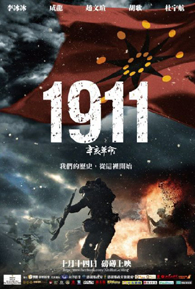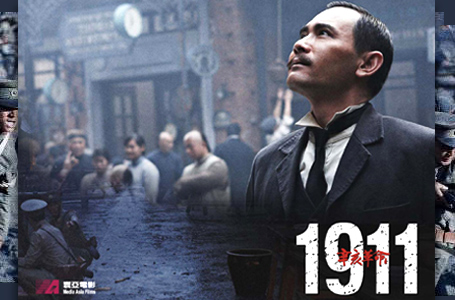
Basically by 1911, Qing China was a doddering, fragmented old empire, helpless against the onslaught of the more aggressive western powers and Japan. It all comes down to the brilliant young physician Sun Yat-Sen to bring China dragging kicking and screaming into the modern world. Winston Chao, everyone’s favourite actor to play Dr Sun Yat Sen since The Soong Sisters, again returns as the good doctor with an Rx for his ailing nation in this epic, alongside Jackie Chan as Huang Xing, one of his most loyal generals.
The movie’s plot, if it can be called that, basically shows the Good Doctor going through scene after scene mouthing off platitude after platitude, intercut with scenes of Huang Xing participating in battles, battles and more battles, accompanied by various little vignettes of other Chinese revolutionaries (quaintly calling themselves 'martyrs') mouthing off platitudes, platitudes and more platitudes about freedom, democracy, people’s livelihoods, the meaning of revolution, children, identity, the nation, country, family, fate and what-not in a high-flown impassioned manner. These characters are defined mostly by their monologues and voice-overs, and not in the good way that would happen in a Terrence Malick film. Captions announce events at the bottom of the screen, and mostly terrible foreign actors deliver lines no one would say in real life, in a terrible manner. To fit with current events, the face of colonial villainy takes on the form of international bankers. It ends with a Social Realist tableau and a few words of praise to the Chinese Communist Party. It’s that kind of movie.
So it is almost a relief to see that the only interesting characters in the film happen to be a couple of the remnants of the old empire. Li Yuanhong and Yuan Shikai, both later Presidents of China, steal the show. Li is portrayed as a humble, homely man who is taken aback by the revolutionaries’ lack of tactical skill when they raise him up as a figurehead and yet proves to be a superior battle tactician. Yuan is a Machiavellian bon vivant who likes his wine and women, and knows how to just get that perfect photo-op. As the Empress Dowager Longyu, Joan Chen essays the dignity and despair of a woman who knows she’s born into the wrong time and is just not up to snuff as her predecessor Cixi was. The fact that the script apparently grants the remnants of the old empire a level of depth, complexity, and likeability not given the film’s heroes just makes you wonder whose side it is really on.
1911 is a bloated, empty, event picture that is all spectacle, mostly hectoring, and little story. See it just to feed your inner revolutionary nationalist or quench your thirst for spectacle. Just don’t expect a good film in any shape or form.

